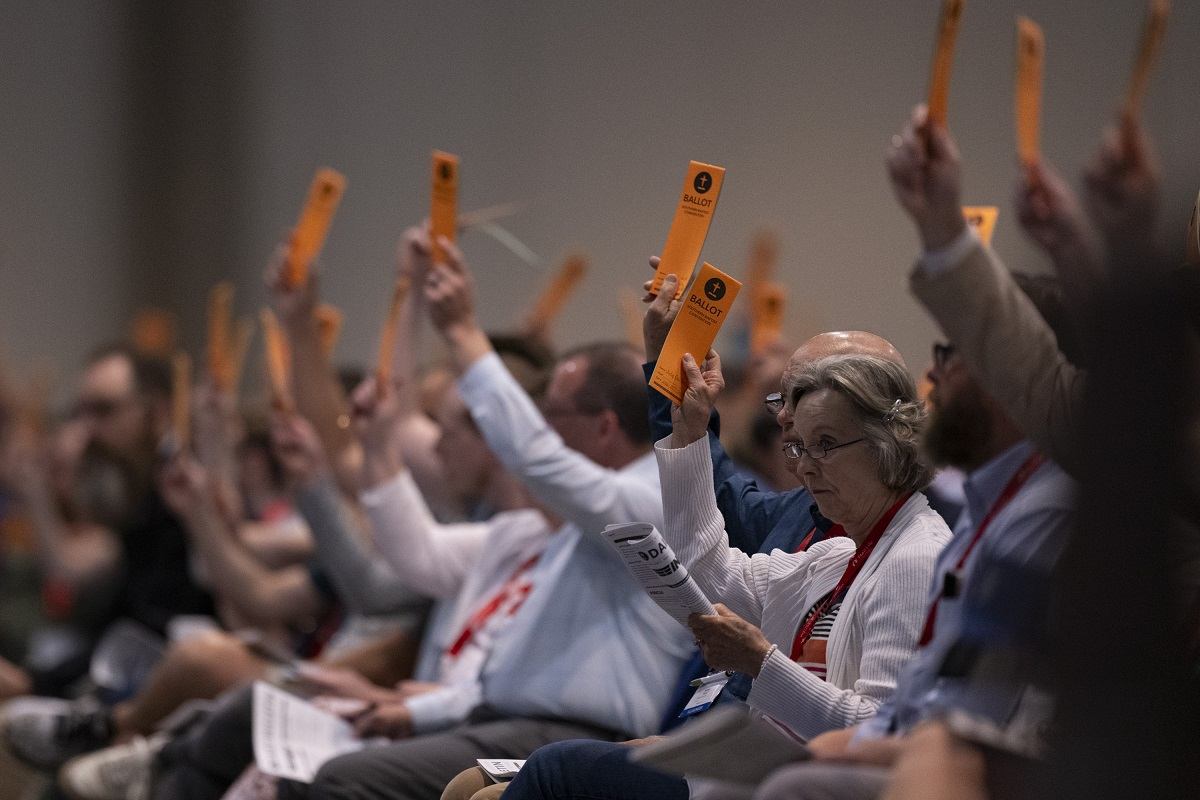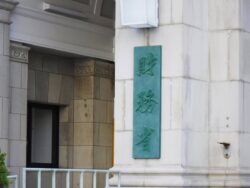
Messengers raise their ballots in support of a motion put up for vote during a Southern Baptist Convention annual meeting Tuesday, June 11, 2024, in Indianapolis.
11:32 JST, June 12, 2024
INDIANAPOLIS (AP) — Even as they prepare to vote on a formal ban on churches with women pastors, delegates to the Southern Baptist Convention annual meeting voted overwhelmingly Tuesday to boot one such church from its ranks.
Messengers, as voting representatives are known, voted 6,759 to 563 to oust First Baptist Church of Alexandria, a historic Virginia congregation that affirms women can serve in any pastoral role, including as senior pastor. A similar scenario played out at last year’s meeting. Two congregations, including a well-known California megachurch, were ejected from the convention. Ninety-two percent of messengers approved this year’s ouster.
The Virginia congregation has been involved in the nation’s largest Protestant denomination since its 19th century founding and has contributed millions toward denominational causes. But it came under scrutiny after the pastor of a neighboring church reported it to denominational authorities over its having a woman as pastor for children and women.
The vote came after the denomination’s credentials committee recommended earlier Tuesday that the denomination deem the church to be not in “friendly cooperation,” the formulation for expulsion, on the grounds that it conflicts with the Baptist Faith and Message. That statement of Southern Baptist doctrine declares only men are qualified for the role of pastor. Some interpret that only to apply to associate pastors as long as the senior pastor is male.
“We find no joy in making this recommendation, but have formed the opinion that the church’s egalitarian beliefs regarding the office of pastor do not closely identify with the convention’s adopted statement of faith,” said Jonathan Sams, chair of the credentials committee.
The Alexandria church is currently led by a man, Robert Stephens, but the church has made clear it believes women can serve as senior pastors, too. Stephens said his church has had women in ministry for more than 44 years and wants to continue cooperating with Southern Baptists who disagreed on this issue.
“First Alexandria stands before you today as a testament that we can maintain a fruitful partnership with churches that take a different stance on women in ministry,” he said. “We at First Baptist are advancing the gospel, and we hope that we will continue to work alongside you all.”
Afterward, representatives from the Alexandria church said they wished the SBC well. But they said they would focus on First Baptist’s own work, ranging from sending a mission team to Nicaragua to partnering on a Bible translation project to taking part in a church youth camp and other ministries.
“This is a sad moment for us, but we also recognize that God has a future for First Baptist Church,” Stephens said.
“We have good news to share with the world, and we will keep doing that,” added Kim Eskridge, the pastor for children and women.
On Wednesday, delegates are slated to consider enshrining a ban on churches with any women pastors in the SBC’s constitution. The proposed amendment received preliminary approval last year, and it requires a final vote this year to be enacted. As of Tuesday evening, 10,895 messengers were registered to take part.
Early Tuesday, a small group of women stood outside the Indiana Convention Center in a low-key demonstration in support of women in ministry.
“I hope that people know women have equal value and can be pastors,” said the Rev. Meredith Stone, executive director of Baptist Women in Ministry. The organization originated among Southern Baptists in the 1980s, but it now works with women in a variety of Baptist denominations.
Joining them was Christa Brown, who has long advocated for fellow survivors of sexual abuse in Southern Baptist churches and criticized the denomination’s resistance to reforms, an effort she has chronicled in a new memoir, “Baptistland.” The Southern Baptists ongoing struggles with sexual abuse reforms is also on this year’s calendar.
She said there’s a direct connection between issues of abuse and the equality of women in ministry.
“When you squash some people, it sets up a lot more people to be squashed,” she said.
An SBC Abuse Reform Implementation Task Force recently concluded its work. While it has provided a curriculum for training churches on preventing and responding to abuse, it has not achieved the mandate of previous annual meetings to establish a “Ministry Check” database of offenders, which could help churches avoid hiring them.
“We’re probably beyond frustrated that there are not names on the database right now or the database is not live right now,” said Josh Wester, chairman of the task force, which officially concluded its work Tuesday. Messengers adopted its recommendations and assigned the denomination’s Executive Committee to complete goals such as activating Ministry Check and creating a “permanent home” for abuse response.
After denominational officials said they couldn’t get insurance for producing a Ministry Watch list, Wester said he and some others set up a separate non-profit organization to maintain it. But he said the Executive Committee’s new leadership is looking for ways to oversee it in-house.
The list would include those convicted or found liable for abuse in civil court — short of an earlier annual meeting’s call for a list including those who confessed or were credibly accused outside of court.
Wester said the ultimate goal is for a broader list.
“We’re just trying to get a database online because it can always be improved,” Wester said.
Though some have advocated for reforms for the past two decades, the SBC has particularly struggled to respond to sexual abuse in its churches since a 2019 report by the Houston Chronicle and San Antonio Express-News. It said that roughly 380 Southern Baptist church leaders and volunteers faced allegations of sexual misconduct in the previous two decades.
The denomination subsequently commissioned a report from a consulting firm, Guidepost Solutions. It concluded that leaders of the convention’s Executive Committee intimidated and mistreated survivors who sought help. The committee handles day-to-day business of the convention.
Some outspoken voices have contended that there is no crisis of abuse in the convention and that such claims are overstated.
But survivor Tiffany Thigpen, one of several advocates for abuse survivors attending the meeting, noted that SBC messengers have repeatedly supported reforms.
“Our hope has been that the messengers finally get as frustrated as we’ve been and say, ‘OK, wait, we’re not allowing this anymore,'” she said.
In events held on the sidelines of the meeting, politics has been featured. On Monday, former President Donald Trump appealed for votes in a videotaped message to attendees of a staunchly anti-abortion conservative group that met next door to the convention center.
On Tuesday, former Vice President Mike Pence told an audience of about 500 that he would “never” vote for President Joe Biden, criticizing him on border, abortion and other policies. But Pence stopped short of endorsing Trump, his estranged onetime running mate.
Later, messengers approved a resolution against any effort to establish a state religion, including “Christianity as the state religion of the United States” — a notable move given the rise of Christian nationalism in some conservative circles. The resolution calls for robust religious freedoms and for Christians to get involved in public office.
"News Services" POPULAR ARTICLE
-

American Playwright Jeremy O. Harris Arrested in Japan on Alleged Drug Smuggling
-

Japan’s Nikkei Stock Average as JGB Yields, Yen Rise on Rate-Hike Bets
-

Japan’s Nikkei Stock Average Licks Wounds after Selloff Sparked by BOJ Hike Bets (UPDATE 1)
-

Japanese Bond Yields Zoom, Stocks Slide as Rate Hike Looms
-

Japan’s Nikkei Stock Average Buoyed by Stable Yen; SoftBank’s Slide Caps Gains (UPDATE 1)
JN ACCESS RANKING
-

Keidanren Chairman Yoshinobu Tsutsui Visits Kashiwazaki-Kariwa Nuclear Power Plant; Inspects New Emergency Safety System
-

Imports of Rare Earths from China Facing Delays, May Be Caused by Deterioration of Japan-China Relations
-

University of Tokyo Professor Discusses Japanese Economic Security in Interview Ahead of Forum
-

Japan Pulls out of Vietnam Nuclear Project, Complicating Hanoi’s Power Plans
-

Govt Aims to Expand NISA Program Lineup, Abolish Age Restriction

























